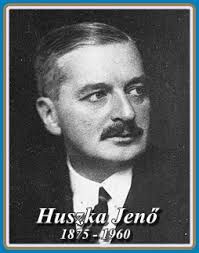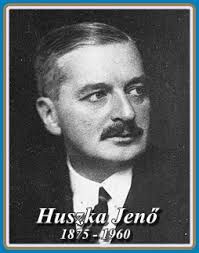The father of a Szeged court judge, Huszka or Huszka Ödön (?-?) who became Catholic on his wedding to Etelkát Burger or Burger Etelkát (1855-1922). Ödön taught Huszka the violin.
Huszka was the eldest of the couple's three children. His father often played music at home, mostly playing the flute. Jenő continued his violin studies at the Szeged City Music Hall, where he soon became known for his talent. He also learned to play the piano on his own, though he was not encouraged by his parents.
When he was a student, he wrote two theatrical works, one of which was 'Párbajhősök' 'Dueling Heroes', never staged, and 'Levél' 'The Letter'. The latter was rejected by Ede Paulay (1836-1894) of the National Theater Nemzeti Színház.
After graduation, he went to Pest in 1893 to study law, but also enrolled at the Music Academy, where he became a student of Jenő Hubay Huber Jenő (1858-1937) and János Koessler or Koessler János or Hans von Koessler or Hans von Kößler (1853-1926).
At that time he was also involved in concert organization, and at one of his concerts, the 18-year-old Ernő Dohnányi Dohnányi Ernő Jenő Frigyes (1877-1960) first appeared in public.
In 1896 he graduated with both legal and musical studies. Although appointed as a freelance trainee at the Ministry of Religion and Education, he applied for one year of unpaid leave to travel to Paris. He was the first violinist in the Lamoureux band touring with them in London.
He returned home in 1897 and entered the ministry. There he met Ferenc Martos Martos Ferenc or Martos Mittelmann (1875-1938), who later became his librettist.
In 1898 he premiered his first theatrical work: 'Tilos a bemenet!' 'Input is forbidden!' was written by Adolf Mérei or Mérei Adolf or Merkl Adolf (1877-1918).
He met Fedák Sári or Fedák Sarolta Klára Mária Sari Fedas (1879-1955), who was unknown at the time, and wrote his next play for her.
'Bob herceg' 'Prince Bob', introduced on 20 December 1902, became a huge success; it was the first Hungarian operetta to be broadcast abroad.
He married his first wife, Lippich Leona or Leona Lippich (?-?), on 30 September 1906. They had two children, Eve Jenő and Lilly Jenő.
In 1921 they separated.
His second wife was Erzsébet Alexandra Margit Mária Aranyi (1897-1977), whom he married in 1928. They had one child, Jenő (1930-?).
Jenő Huszka died of pneumonia on 2 February 1960 at 2am. His tomb is in the Farkasréti temető Farkasrét Cemetery, Budapest, Németvölgyi út 99, 1124 Hungary.
WORKS
Tilos a bemenet (Mérei Adolf), énekes bohózat (1899. szeptember 2.)
Bob herceg (Martos Ferenc és Bakonyi Károly), operett (1902. december 20.)
Aranyvirág (Martos Ferenc) (1903. november 6.)
Gül Baba (1905. december 9.)
Tündérszerelem (1907. december 20.)
Rébusz báró (Herczeg Ferenc-Martos Ferenc) (1909. november 20.)
Nemtudomka (Martos Ferenc) (1914. január 14.)
Lili bárónő, operett (1919. március 7.)
Hajtóvadászat (1926. október 20.)
Erzsébet (Szilágyi László) (1939. január 5.)
Gyergyói bál (1941. január 4.)
Mária főhadnagy, operett (1942. szeptember 24.)
Szép Juhászné (Kristóf Károly), daljáték (1954. december 19. Magyar Rádió; 1955. május 8. Szeged)
Szabadság, szerelem (Háy Gyula – Fisher Sándor Jókai Mór után) (1955. április 1.)
MOVIE VERSIONS OF HIS OPERETTAS
Gül Baba (rendezte Nádasdy Kálmán) 1940
Erzsébet királyné (rendezte Podmaniczky Félix) 1940
Bob herceg (rendezte Kalmár László) 1941
Zenélő malom[6] (rendezte ifj. Lázár István) 1943
Gábor diák[7] (rendezte Keleti Márton) 1955
Bob herceg (rendezte Keleti Márton) 1972
Lili bárónő (rendezte Kalmár András) 1975
SONGS
Londonban, hej, van számos utca (Bob herceg)
Dal az első szerelmes csókról (Bob herceg)
Ott túl a rácson (Gül Baba)
Leila keringője (Gül Baba)
Darumadár fönn az égen (Gül Baba)
Szellők szárnyán (Lili bárónő)
Egy kis cigaretta, valódi, finom (Lili bárónő)
Tündérkirálynő, légy a párom (Lili bárónő)
Délibábos Hortobágyon (Mária főhadnagy)
Rózsám, viruló kis rózsám (Erzsébet)
Doktor úr, a maga szíve sose fáj (Szabadság, szerelem)
The father of a Szeged court judge, Huszka or Huszka Ödön (?-?) who became Catholic on his wedding to Etelkát Burger or Burger Etelkát (1855-1922). Ödön taught Huszka the violin.
Huszka was the eldest of the couple's three children. His father often played music at home, mostly playing the flute. Jenő continued his violin studies at the Szeged City Music Hall, where he soon became known for his talent. He also learned to play the piano on his own, though he was not encouraged by his parents.
When he was a student, he wrote two theatrical works, one of which was 'Párbajhősök' 'Dueling Heroes', never staged, and 'Levél' 'The Letter'. The latter was rejected by Ede Paulay (1836-1894) of the National Theater Nemzeti Színház.
After graduation, he went to Pest in 1893 to study law, but also enrolled at the Music Academy, where he became a student of Jenő Hubay Huber Jenő (1858-1937) and János Koessler or Koessler János or Hans von Koessler or Hans von Kößler (1853-1926).
At that time he was also involved in concert organization, and at one of his concerts, the 18-year-old Ernő Dohnányi Dohnányi Ernő Jenő Frigyes (1877-1960) first appeared in public.
In 1896 he graduated with both legal and musical studies. Although appointed as a freelance trainee at the Ministry of Religion and Education, he applied for one year of unpaid leave to travel to Paris. He was the first violinist in the Lamoureux band touring with them in London.
He returned home in 1897 and entered the ministry. There he met Ferenc Martos Martos Ferenc or Martos Mittelmann (1875-1938), who later became his librettist.
In 1898 he premiered his first theatrical work: 'Tilos a bemenet!' 'Input is forbidden!' was written by Adolf Mérei or Mérei Adolf or Merkl Adolf (1877-1918).
He met Fedák Sári or Fedák Sarolta Klára Mária Sari Fedas (1879-1955), who was unknown at the time, and wrote his next play for her.
'Bob herceg' 'Prince Bob', introduced on 20 December 1902, became a huge success; it was the first Hungarian operetta to be broadcast abroad.
He married his first wife, Lippich Leona or Leona Lippich (?-?), on 30 September 1906. They had two children, Eve Jenő and Lilly Jenő.
In 1921 they separated.
His second wife was Erzsébet Alexandra Margit Mária Aranyi (1897-1977), whom he married in 1928. They had one child, Jenő (1930-?).
Jenő Huszka died of pneumonia on 2 February 1960 at 2am. His tomb is in the Farkasréti temető Farkasrét Cemetery, Budapest, Németvölgyi út 99, 1124 Hungary.
WORKS
Tilos a bemenet (Mérei Adolf), énekes bohózat (1899. szeptember 2.)
Bob herceg (Martos Ferenc és Bakonyi Károly), operett (1902. december 20.)
Aranyvirág (Martos Ferenc) (1903. november 6.)
Gül Baba (1905. december 9.)
Tündérszerelem (1907. december 20.)
Rébusz báró (Herczeg Ferenc-Martos Ferenc) (1909. november 20.)
Nemtudomka (Martos Ferenc) (1914. január 14.)
Lili bárónő, operett (1919. március 7.)
Hajtóvadászat (1926. október 20.)
Erzsébet (Szilágyi László) (1939. január 5.)
Gyergyói bál (1941. január 4.)
Mária főhadnagy, operett (1942. szeptember 24.)
Szép Juhászné (Kristóf Károly), daljáték (1954. december 19. Magyar Rádió; 1955. május 8. Szeged)
Szabadság, szerelem (Háy Gyula – Fisher Sándor Jókai Mór után) (1955. április 1.)
MOVIE VERSIONS OF HIS OPERETTAS
Gül Baba (rendezte Nádasdy Kálmán) 1940
Erzsébet királyné (rendezte Podmaniczky Félix) 1940
Bob herceg (rendezte Kalmár László) 1941
Zenélő malom[6] (rendezte ifj. Lázár István) 1943
Gábor diák[7] (rendezte Keleti Márton) 1955
Bob herceg (rendezte Keleti Márton) 1972
Lili bárónő (rendezte Kalmár András) 1975
SONGS
Londonban, hej, van számos utca (Bob herceg)
Dal az első szerelmes csókról (Bob herceg)
Ott túl a rácson (Gül Baba)
Leila keringője (Gül Baba)
Darumadár fönn az égen (Gül Baba)
Szellők szárnyán (Lili bárónő)
Egy kis cigaretta, valódi, finom (Lili bárónő)
Tündérkirálynő, légy a párom (Lili bárónő)
Délibábos Hortobágyon (Mária főhadnagy)
Rózsám, viruló kis rózsám (Erzsébet)
Doktor úr, a maga szíve sose fáj (Szabadság, szerelem)
Sponsored by Ancestry
Advertisement
Advertisement


